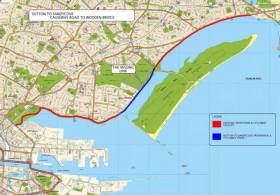Displaying items by tag: Barry Ward
A Fine Gael Senator has thrown his support behind the campaign by World Sailing to reinstate sailing as a Paralympic sport in the 2028 Games in Los Angeles.
Senator Barry Ward said, “Sailing featured in every Paralympic Games between Sydney 2000 and Rio 2016, but unfortunately it did not make the cut for the 2020 Games in Tokyo. It is a sport in which Ireland does well. We all remember, for example, the silver medal win by Annalise Murphy, who sails in my own club in Dún Laoghaire, at the 2016 Olympic Games.
“Sailing is an inclusive team sport, and globally, the sailing community does not distinguish between athletes who are able-bodied and athletes who are not. We all compete together with the same rules.
“There are plenty of athletes with a range of physical, sensory or intellectual disabilities who would like to compete, and represent their country in Paralympic sailing.
“World Sailing, which is the global governing body for the sport, is currently building support to reinstate sailing as a Paralympic sport in time for the 2028 Games in Los Angeles. While the International Olympic Committee is yet to confirm the bidding process for the Games, I fully support World Sailing in their efforts and call on my colleagues across Government and the Oireachtas to do the same,” concluded Senator Ward.
This week World Sailing officially kick-started their campaign for sailing to be reinstated at the Paralympic Games in Los Angeles (USA) in 2028.
The governing body has outlined a set of strategic priorities to support the growth of the sport by 2023:
- Increase worldwide participation to 45 nations on 6 continents.
- Increase youth participation (below the age of 30) to 20% of total athletes.
- Grow the number of female participants to 30% and, ultimately, to achieve gender parity.
Focusing on diversity, inclusion, affordability, development, and increasing the number of open and Para sailing events are all part of World Sailing's framework to build on the success of Para sailing.
"We know that other major sports looking for reinstatement are already drawing up their bid plans," commented David Graham, CEO of World Sailing. "We know that IPC President, Andrew Parsons, has already publicly declared that the IPC will be looking at potential 'new sports' following the successful introduction of new, youth-focused sports at Tokyo 2020. We are on track to achieve our strategic priorities by 2023 and we are taking nothing for granted."
The International Paralympic Committee (IPC) has yet to confirm the bid process for LA28, however World Sailing is proactively launching its campaign to galvanize support and build on the growth of Para sailing: "It is a critical task of World Sailing to reinstate Para sailing in the Paralympics," stated Quanhai Li, President of World Sailing. "We must pro-actively coordinate with the International Paralympic Committee to further understand the entry standards and requirements, and I am in direct contact with the IPC President on this matter as we continue our work towards reinstatement at the Los Angeles Games in 2028."
The 2028 Summer Paralympic Games, known as LA28, will be the first held in the United States since 1996 when Para sailing made its debut at the Atlanta 1996 Paralympic Games as a demonstration sport. Para sailing was a successful Paralympic sport for five consecutive Games from Sydney 2000 to Rio 2016.
Dun Laoghaire-Rathdown Councillor Barry Ward will be among the speakers at a public meeting in Dun Laoghaire later this month on the S2S (Sutton to Sandycove) coastal promenade and cycleway around Dublin Bay.
Long in the development stages, the S2S has been beset by planning snags and funding issues, and as yet only sections on the northern side of Dublin Bay between Sutton and Clontarf have been completed.
Michael Collins (S2S) and Clara Clark (Cycling Without Age) will also address the meeting at the Royal Marine Hotel on Tuesday 22 October from 7.30pm to discuss current and future moves on the project, including the €17.5 million allocated earlier this year for the section from Merrion Gates to Dun Laoghaire Harbour.
All are welcome to attend.





























































